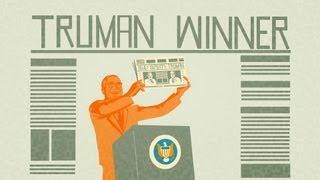(单词翻译:单击)
We are constantly asked for our opinions.
我们经常被问及想法。
Which team do you think will win the Super Bowl?
哪支球队会赢得超级碗?
Who wore it better on the red carpet?
红地毯上谁穿着更佳?
Who are you going to vote for for mayor?
你选谁当市长?
Public opinion polls are everywhere.
民意调查无处不在。
Important decision makers in American government have long relied on public opinion polls throughout elections and important legislation.
美国政府的重要决策者在选举中和重要立法上常常参考民意调查。
The problem is public opinion isn't easy to track and, often times, isn't even right.
但民意不是那么容易捉摸,有时甚至不准确。
In 1948, the 'Chicago Daily Tribune' ran a now famous headline: "Dewey Defeats Truman," they cried in big, bold, black and white letters.
1948年,《芝加哥论坛报》刊登一则头条“杜威击败杜鲁门”,标题用黑白相间大号加粗字体。
The problem is that Dewey hadn't defeated Truman.
而事实上,杜威还没有击败杜鲁门。
The 'Tribune' had relied on polls to come to their conclusion. Whoops!
该论坛报通过民意调查得出了这一结论。哎呦!
This happens all the time because public opinion polls are either inaccurate or misleading.
这种事经常发生,因为民意调查往往容易误导人。
So, why are they wrong? And why do we keep using them?
民调怎么会是错的?为什么我们还继续沿用呢?
First, let's start with an important term: sample.
我们先从一个重要的术语开始:样本。
A sample is the group of people that respond to questions during a public opinion poll.
样本是指参与问卷调查的一群人,
A poll's quality rests largely on its sample, and a sample can be bad in a few key ways.
民调的质量跟样本息息相关,但样本在一些重要方面有局限。
It can be too small, too narrow, or the poll itself can be too difficult.
可能数量太少,范围太窄或者本身难度高。
Polls that are too small are bad for obvious reasons.
样本太小引起的缺点很明显。
And while you can't possibly ask every single person in America for their opinion,
由于你不可能搜集到每一个美国人的意见,
the more people you ask, the more accurate your prediction.
因此,你调查的人越多,得出的结论就越可靠。
Polls that are too narrow, that only ask a certain type of person a question, are bad, too.
那些范围太窄的调查,只问固定一种人一个问题,也很不好。
Consider a poll about whether or not the potato is the best vegetable in America.
假设有一个调查是关于土豆是否是美国最好的蔬菜。
If you only asked people in Idaho, where the state food is the potato,
如果你只问爱达荷州人,那里盛产土豆,
chances are that you would get a much different answer than if you asked people in the state of New Mexico, where the state vegetable is beans.
你得到的结果很可能会不同于在新墨西哥州的调查结果,因为那里盛产的蔬菜是豆类。

Getting the right kind of diversity in your sample means making sure that your sample has a range of ages,
选择合适比例的调查人群,意味着你要保证调查人群有不同的年龄、
races, genders, and geographic regions, just to name a few.
种族、性别、地域差异等等。
Finally, polls that are too hard can't tell you much either.
最后,民意调查很难告诉你很多事情。
If you're asking people for their opinions on things about which they have no prior knowledge, the results will be pointless.
如果你问人们对于一些事物的看法,关于一些他们没有优势的知识领域,结果很可能是没有意义的。
You're better off shaking a Magic 8 ball.
还不如占卜问卦来的准。
It's not just the people you're asking that can cause bias, though.
调查不仅仅跟受访者的偏见有关。
The person doing the asking is part of the problem, too. That's called interviewer bias.
问问题的人也会影响结果,那叫做调查者偏见。
Interviewer bias is all about the effect that the person asking the questions has on the sample.
调查者偏见在于问问题的时候,把自己的想法在无形中影响调查对象。
Humans generally don't like confrontation.
人类普遍不喜欢面对现实。
People worry that their answers may make them look bad.
人们害怕自己的回答会让他们看起来很糟。
Therefore, we find that people tend to give socially desirable responses, not necessarily their honest opinions,
于是,我们发现人们更倾向于提供一些看似更社会化的答案,那不一定是真实想法,
because they don't want to come across as heartless, racist, or bigoted.
因为他们不想被认为是没心没肺、种族歧视或者是心胸狭窄的人。
And the way we word our questions matters too.
此外,问题的叙述方式也有影响。
When polls purposely sway the answers one way or the other, it's called a push poll because it pushes people to answer a certain way.
当调查有目的的把答案指向一方,这种行为就叫推离式民意调查,因为它推动人们以某种特定的方式回答。
"Would you vote for candidate Smith?" is a perfectly normal question.
“你会投给史密斯候选人吗?”就是个典型的例子。
"Would you vote for candidate Smith if you knew that he robs senior citizens?" is a push poll.
“如果你知道史密斯剥夺年长公民的权利,你还会选他吗?”也是一个推离式民意调查。
So, if polls are open to all sorts of manipulation and inaccuracies, why are they still so prevalent?
所以,既然民意调查存在着各种操纵和不准确之处,那为什么人们仍然大量使用呢?
Despite their flaws, public opinion polls provide us with some sense of the thoughts and moods of large groups of people.
尽管民意调查有缺陷,但还是能够反映大众的想法和心情。
They offer politicians the chance to pass legislation they think a majority of Americans will support.
它们给政治人物提供某些机会,去推动他们认为大多数美国人可能会支持的法案。
They help fashionistas on TV know which star wore the dress better on the red carpet.
它们让电视上的时尚达人知道,哪位明星走红毯时的衣着更佳。
Finally, they make us, the people who get polled, feel as though our voice has been heard.
最后,民调使我们--那些被询问意见的人们--觉得自己的声音已获得采纳。
So, next time you get a phone call asking your opinion, or if you see a poll online,
因此,下次你接到询问你意见的电话或看到在线调查时,
take some time to think about who is asking and why they're asking.
花点时间想想是谁在问问题,以及为什么他们要问。
Then, take that poll, and its results, with a grain of salt or a potato.
然后以批判的眼光去看待民意调查及其结果。


